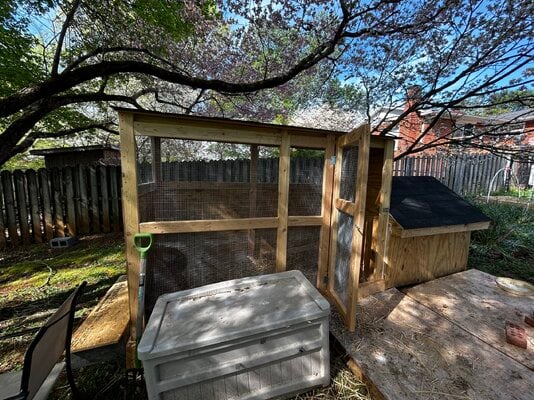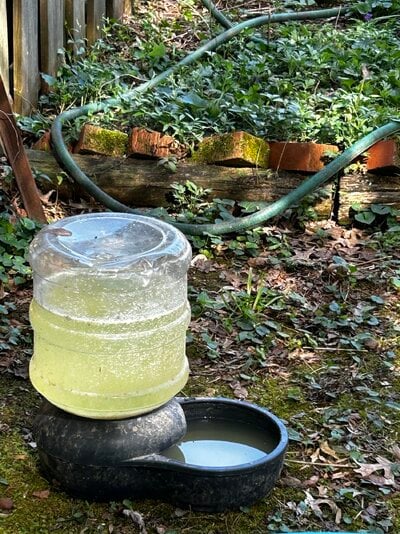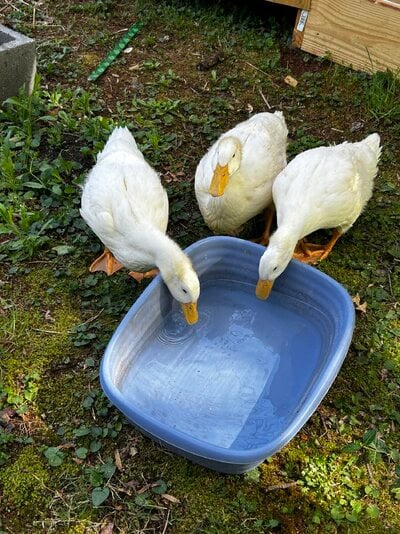awkwardkale
Songster
Hi there!
How do I know if I’m doing the deep litter method correctly? By deep litter, I mean the one where the bedding is actively compositing in the run. I’m concerned because it just seems kinda wet. I have straw for bedding. Im just concerned about whether or not I need to start over again? I don't want to endanger the ducks or expose them to respiratory issues.
I have four Pekin ducks. And boy do they poop a lot! When my mom and I started letting them outside for the first time, they were confined to the run with their food and water in the straw. They of course made a pretty big mess, although I ended up removing all the soaked bedding. Now they have a whole big area to run around in, so they’re only in the run for the night. The water stays out all day.
They’re still fairly young, so we have been leaving their water in the run over night for them. The waterer is in an empty litter box that catches most of the stuff they spill. My concern is that they poop a lot at night, and I don’t know if it’s because they have access to water overnight that’s causing them to go more? Because every morning when I let them out, the straw has been flattened down and throughly pooped on is that normal?
is that normal?
Every morning I’ve been going in with a pitch fork and breaking everything up and turning it over. Then I cover everything with fresh straw. It just seems damp and I’m concerned about mold growing. I used some DE the other day to dry it out, but then I read that it’s not good to use for deep litter so I haven’t added any more. It doesn’t smell awful, just like damp straw and poop, no ammonia from what I can tell. It doesn’t burn my nose. The straw on the bottom is definitely wet..
Here’s some info about the set up:
The floor of the run is a dirt floor, with hardware cloth on the bottom to keep things from digging into it. I poured some topsoil over the cloth before adding straw just to press it down.
I don’t think ventilation is an issue—one side of the house is hardware cloth, and the other sides that are mostly wood still have hardware cloth at the top. The only spot without ventilation is the duck house. It has a wooden floor, so we’re not doing the deep litter method in there. We might also put a vent in the house— our family friend who built it was really worried about them having a spot completely protected from the wind.
The climate I live in is hot and humid in the summer. I’m in the South. The coop itself is located under a bunch of trees, but it gets lots of sun in the afternoon and evening. I don’t know if it matters, but the coop is on a bit of a slope, so excess water does drain downhill to some extent.
I’ll attach some pictures too:
I fill the blue bin with water during the day, but then I empty it and use it as a tray for the other waterer when I bring it into the coop. The yellow stuff is nutritional yeast. Again, the ducks are only in this spot at night and in the morning before i let them out.
How do I know if I’m doing the deep litter method correctly? By deep litter, I mean the one where the bedding is actively compositing in the run. I’m concerned because it just seems kinda wet. I have straw for bedding. Im just concerned about whether or not I need to start over again? I don't want to endanger the ducks or expose them to respiratory issues.
I have four Pekin ducks. And boy do they poop a lot! When my mom and I started letting them outside for the first time, they were confined to the run with their food and water in the straw. They of course made a pretty big mess, although I ended up removing all the soaked bedding. Now they have a whole big area to run around in, so they’re only in the run for the night. The water stays out all day.
They’re still fairly young, so we have been leaving their water in the run over night for them. The waterer is in an empty litter box that catches most of the stuff they spill. My concern is that they poop a lot at night, and I don’t know if it’s because they have access to water overnight that’s causing them to go more? Because every morning when I let them out, the straw has been flattened down and throughly pooped on
Every morning I’ve been going in with a pitch fork and breaking everything up and turning it over. Then I cover everything with fresh straw. It just seems damp and I’m concerned about mold growing. I used some DE the other day to dry it out, but then I read that it’s not good to use for deep litter so I haven’t added any more. It doesn’t smell awful, just like damp straw and poop, no ammonia from what I can tell. It doesn’t burn my nose. The straw on the bottom is definitely wet..
Here’s some info about the set up:
The floor of the run is a dirt floor, with hardware cloth on the bottom to keep things from digging into it. I poured some topsoil over the cloth before adding straw just to press it down.
I don’t think ventilation is an issue—one side of the house is hardware cloth, and the other sides that are mostly wood still have hardware cloth at the top. The only spot without ventilation is the duck house. It has a wooden floor, so we’re not doing the deep litter method in there. We might also put a vent in the house— our family friend who built it was really worried about them having a spot completely protected from the wind.
The climate I live in is hot and humid in the summer. I’m in the South. The coop itself is located under a bunch of trees, but it gets lots of sun in the afternoon and evening. I don’t know if it matters, but the coop is on a bit of a slope, so excess water does drain downhill to some extent.
I’ll attach some pictures too:
I fill the blue bin with water during the day, but then I empty it and use it as a tray for the other waterer when I bring it into the coop. The yellow stuff is nutritional yeast. Again, the ducks are only in this spot at night and in the morning before i let them out.









